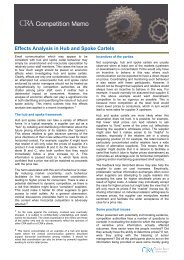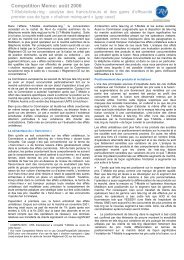CUSTOMER AGREED REMUNERATION - CRA International
CUSTOMER AGREED REMUNERATION - CRA International
CUSTOMER AGREED REMUNERATION - CRA International
Create successful ePaper yourself
Turn your PDF publications into a flip-book with our unique Google optimized e-Paper software.
REPORT BY <strong>CRA</strong> INTERNATIONAL<br />
2.2<br />
2.2.1<br />
pronounced for non-purchasers who felt that advisers would “Sell you products you do not<br />
need for their own gain”. 10<br />
However, despite this link between trust and remuneration, this does not necessarily<br />
mean that non-purchasers would become purchasers if they trusted the industry more.<br />
Even after targeting consumers who are considering purchasing a financial product, we<br />
found that by far the most important reason for not purchasing previously was not having<br />
enough money to invest (60% of respondents). Indeed, a lack of trust was only<br />
mentioned by 10% of non-purchasers as the reason for not purchasing. For this reason,<br />
it is important to be cautious regarding the impact that improving the perception of<br />
advice would have on non-purchasers.<br />
Impact of CAR on understanding and trust<br />
CAR could bring benefits to consumers if it removes a concern regarding the financial<br />
services industry or if it provides them with information to make better decisions. In this<br />
section we examine whether consumers understand CAR at a high level and then whether<br />
this improves their perception of the industry. Finally, we examine whether this might<br />
change the way that they behave.<br />
Understanding CAR<br />
During our focus group research, we found that the way CAR was explained had an<br />
important influence on consumer understanding of the concept. In our first focus group<br />
we included a reference to fees in the description of CAR. 11 We found that customers were<br />
confused about the concept of CAR believing that it implied a movement towards up-front<br />
payment of unconditional fees. This provoked a very adverse reaction to CAR reflecting<br />
the traditional reluctance of the majority of customers to pay a fee for advice.<br />
In subsequent focus groups, we modified the description of CAR (to that found in section<br />
1.1) by removing reference to fees. This resulted in a very different reaction to the<br />
concept which customers viewed favourably and saw as easy to understand. This ease of<br />
understanding was also supported by evidence from the quantitative survey where, using<br />
the same description of CAR, we found that:<br />
• 84% agreed that “the concept was easy for me to understand”; and<br />
• 56% disagreed with the statement that “the complexity of this approach would put<br />
me off seeking advice”.<br />
Intermediaries were also asked about what they thought the likely impact would be from<br />
their clients. Intermediaries were concerned that this would confuse customers, with over<br />
10 This is consistent with the evidence from “Consumer confidence in the financial services industry, Consumer<br />
Panel Research Paper 2/2005”, Financial Services Consumer Panel, 2005, which finds that more than half of<br />
consumers think that financial services firms sell the products that pay the most commission.<br />
11 The material used stated that customers will have the option to pay for advice through an upfront fee or by<br />
paying through charges on a product bought.<br />
18




